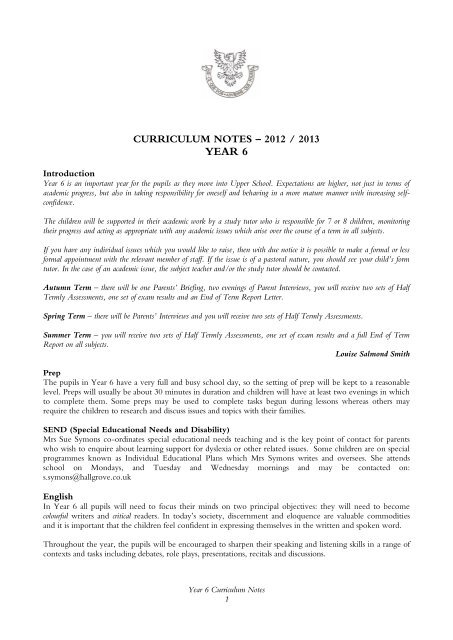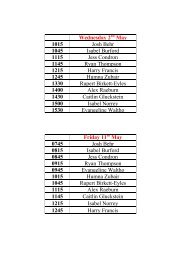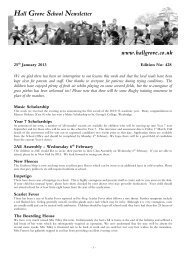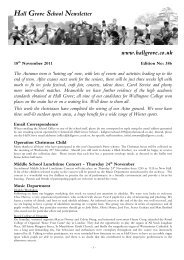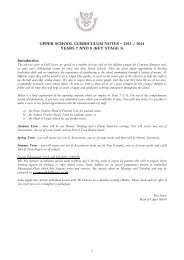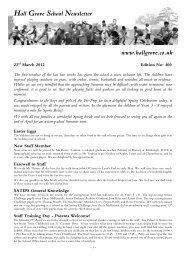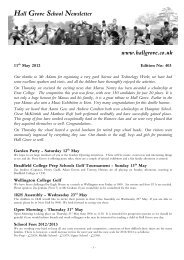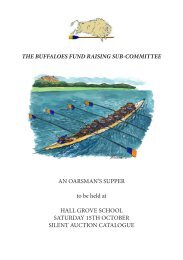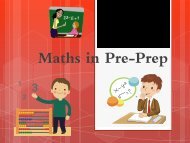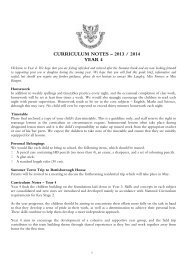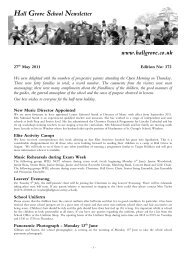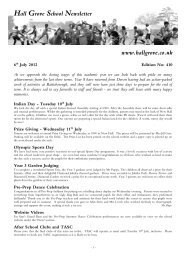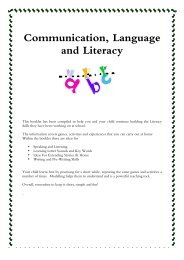Year 6 - Hall Grove School
Year 6 - Hall Grove School
Year 6 - Hall Grove School
Create successful ePaper yourself
Turn your PDF publications into a flip-book with our unique Google optimized e-Paper software.
CURRICULUM NOTES – 2012 / 2013<br />
YEAR 6<br />
Introduction<br />
<strong>Year</strong> 6 is an important year for the pupils as they move into Upper <strong>School</strong>. Expectations are higher, not just in terms of<br />
academic progress, but also in taking responsibility for oneself and behaving in a more mature manner with increasing selfconfidence.<br />
The children will be supported in their academic work by a study tutor who is responsible for 7 or 8 children, monitoring<br />
their progress and acting as appropriate with any academic issues which arise over the course of a term in all subjects.<br />
If you have any individual issues which you would like to raise, then with due notice it is possible to make a formal or less<br />
formal appointment with the relevant member of staff. If the issue is of a pastoral nature, you should see your child’s form<br />
tutor. In the case of an academic issue, the subject teacher and/or the study tutor should be contacted.<br />
Autumn Term – there will be one Parents’ Briefing, two evenings of Parent Interviews, you will receive two sets of Half<br />
Termly Assessments, one set of exam results and an End of Term Report Letter.<br />
Spring Term – there will be Parents’ Interviews and you will receive two sets of Half Termly Assessments.<br />
Summer Term – you will receive two sets of Half Termly Assessments, one set of exam results and a full End of Term<br />
Report on all subjects.<br />
Louise Salmond Smith<br />
Prep<br />
The pupils in <strong>Year</strong> 6 have a very full and busy school day, so the setting of prep will be kept to a reasonable<br />
level. Preps will usually be about 30 minutes in duration and children will have at least two evenings in which<br />
to complete them. Some preps may be used to complete tasks begun during lessons whereas others may<br />
require the children to research and discuss issues and topics with their families.<br />
SEND (Special Educational Needs and Disability)<br />
Mrs Sue Symons co-ordinates special educational needs teaching and is the key point of contact for parents<br />
who wish to enquire about learning support for dyslexia or other related issues. Some children are on special<br />
programmes known as Individual Educational Plans which Mrs Symons writes and oversees. She attends<br />
school on Mondays, and Tuesday and Wednesday mornings and may be contacted on:<br />
s.symons@hallgrove.co.uk<br />
English<br />
In <strong>Year</strong> 6 all pupils will need to focus their minds on two principal objectives: they will need to become<br />
colourful writers and critical readers. In today’s society, discernment and eloquence are valuable commodities<br />
and it is important that the children feel confident in expressing themselves in the written and spoken word.<br />
Throughout the year, the pupils will be encouraged to sharpen their speaking and listening skills in a range of<br />
contexts and tasks including debates, role plays, presentations, recitals and discussions.<br />
<strong>Year</strong> 6 Curriculum Notes<br />
1
All pupils will study a number of set texts in class and will also be given excerpts from a wide range of genres<br />
including short stories, poetry, journals, diaries, reports and speeches. Their reading skills will be continually<br />
monitored in comprehension exercises and discussions.<br />
The children will be asked to complete many creative writing assignments as they develop their use and<br />
appreciation of figurative language. To gain high marks in examinations and, more importantly, to grow into<br />
effective writers, the pupils will learn to make use of colourful, engaging description and characterisation in<br />
compositions.<br />
A brief summary of the main topics, which will form the focus of our grammar and writing studies follows:<br />
Autumn Term<br />
Sentence Level Work: revision of nouns, verbs, adjectives, direct and reported speech<br />
Text Level Work: letter writing, non-chronological recounts, explanatory texts, story beginnings.<br />
Spring Term<br />
Sentence Level Work: main and subordinate clauses, similes and metaphors, active and passive voice, use of<br />
apostrophes.<br />
Text Level Work: writing a synopsis, poetry (blank verse using personification), chronological and<br />
instructional texts, characterization, devising effective story plots.<br />
Summer Term<br />
Sentence Level Work: using colons, semi-colons, commas, discursive texts (balanced arguments), persuasive<br />
texts (debate speeches).<br />
Text Level Work: critical analysis, parodying literary styles, play scripts, using time in stories.<br />
<strong>Year</strong> 6 Curriculum Notes<br />
2<br />
John Waltho<br />
Poetry<br />
I do very much enjoy meeting <strong>Year</strong> 6 once a week for poetry reading, and it is a great opportunity for me to<br />
get to know the children. Do please encourage your child if he/she is asked to learn a poem, and do what you<br />
can to share any interest that you might have. I hope we will find an opportunity to invite you in to hear<br />
some recitations later in the year.<br />
Alastair Graham<br />
Mathematics<br />
<strong>Year</strong> 6 Maths will be taught by Mrs Cowell, Mr Joll and Mr Marland.<br />
In <strong>Year</strong> 6 the principal focuses are the end of year exams and 11+ CE and other Entrance Exams. We follow<br />
the Galore Park Maths text books, which are suited to the requirements of Common Entrance. The aim of<br />
this ISEB endorsed book is to give pupils a good grounding in Maths which will equip them for the 11+<br />
Common Entrance exams, before embarking on the rigours of the ISEB 13+ Common Entrance. Together<br />
with additional resources, this scheme provides ample coverage of the <strong>Year</strong> 6 syllabus, with plenty of material<br />
to extend and/or support pupils as the opportunity or need arises. The broad topics covered this year are as<br />
follows:-<br />
Autumn Term:<br />
Place value, ordering, rounding, negative numbers<br />
Odd, even, square, cube, powers<br />
Using a calculator<br />
Mental calculation strategies<br />
Problem solving<br />
Fractions, decimals, percentages, ratio and proportion<br />
Handling data<br />
Shape and space (2 and 3D)<br />
Reflective symmetry, reflection and translation
Area and perimeter<br />
Algebra<br />
Spring Term<br />
Place value, ordering, rounding<br />
Mental calculation strategies<br />
Fractions, decimals, percentages, ratio, proportion<br />
Shape and space: angle and rotation<br />
Measure: area and mass<br />
Handling data<br />
Properties of number and number sequences<br />
Algebra<br />
Summer Term:<br />
Problem solving<br />
Rapid recall of multiplication and division facts<br />
Fraction, decimals, percentages, ratio and proportion<br />
Handling data<br />
Reflective symmetry, reflection and translation<br />
Angle and rotation<br />
Position and direction<br />
Time<br />
Capacity<br />
Number sequences<br />
Algebra<br />
Properties of a circle / finding area and circumference<br />
During <strong>Year</strong> 6, the pupils are continually assessed and tested. In accordance with National Curriculum<br />
Attainment Target (AT1), Using and Applying Mathematics, the pupils are encouraged to:-<br />
Apply their knowledge of mathematics in real life concepts<br />
Make decisions and solve problems<br />
Ask and respond to questions in mathematical language<br />
Develop their thinking skills<br />
Develop their practical skills<br />
Maths homework will be set each week and will relate to the current topic. If parents would like to help at<br />
home, regular tables practice and simple mental arithmetic tests would be of great value.<br />
We are hopeful that the children in <strong>Year</strong> 6 will not only be successful and well motivated, but that they will<br />
gain much enjoyment from mathematics.<br />
Jane Brice<br />
Science<br />
All <strong>Year</strong> 6 Science will be taught by Mrs Vernon-Smith.<br />
The areas of work are outlined below. There will be a healthy mix of written and practical work, where the<br />
children will learn skills as well as facts and concepts. There will be 5 x 40 minute lessons per week including<br />
one of Biology. We consider that the children get a substantial amount of Science input during the week and<br />
so a regular Science homework is not necessary. However, there may be occasional homework assignments<br />
for finishing work, consolidating concepts or researching or information.<br />
Physics<br />
<br />
<br />
Forces: magnets; gravity; air resistance; friction<br />
Light: basic properties; mirrors; prisms<br />
<strong>Year</strong> 6 Curriculum Notes<br />
3
Sound: basic properties; pitch; volume<br />
The Earth and its place in the solar system:<br />
orbits; relationship between Sun, Earth, Moon; day & night; seasons<br />
Electricity: simple & extended circuits; parallel & series<br />
Chemistry<br />
<br />
<br />
<br />
<br />
<br />
Chemical reactions: reversible & irreversible<br />
Properties of materials including metals<br />
States of matter<br />
Mixtures: making (eg dissolving) & separating (eg filtering)<br />
Heat: temperature; insulation & conduction; burning<br />
Biology<br />
<br />
<br />
<br />
<br />
<br />
<br />
<br />
Micro-organisms<br />
Life Processes (humans): Growth, Reproduction, Health, Circulation, Movement, Nutrition<br />
Feeding relationships: food chains & webs<br />
Adaptations<br />
Variation and Classification; Keys<br />
Green Plants: Structure & function, reproduction, growth, nutrition, seeds & germination<br />
Habitat studies: field work on site and/or in local area<br />
Informal topic tests are conducted throughout the year and <strong>School</strong> exams are taken in the Summer Term.<br />
During the year, <strong>Year</strong> 6 also attend a talk on ‘Growing Up’ where a local midwife leads a discussion on<br />
puberty (physical and emotional changes). You will be contacted in advance to advise you of the date.<br />
<strong>Year</strong> 6 Curriculum Notes<br />
4<br />
Jenny Vernon-Smith<br />
French<br />
<strong>Year</strong> 6 will start the year with revisions of the topics and grammar points they studied last year, and then<br />
continue with more elementary but fundamental topics and points of grammar. This year is very important as<br />
we will cover many topics and grammar rules and tenses necessary for the Common Entrance examination.<br />
The four language skills of speaking, listening, reading and writing will continue to carry equal value.<br />
The course is topic based and during the year the following areas are covered:<br />
yourself, where you live, your family, your pets<br />
school life<br />
school subjects<br />
asking and giving the time<br />
school routine<br />
clothes<br />
leisure<br />
sports<br />
weather and seasons<br />
likes and dislikes<br />
my home<br />
giving your address<br />
saying where you live (suburb; city centre; seaside; etc.)<br />
type of habitation<br />
rooms in the house<br />
furniture<br />
in town
Understanding and giving directions<br />
shopping, clothes, meals, food and drink<br />
While understanding and speaking the language remain paramount, more formal written work is introduced<br />
during the year. Basic grammatical structures are reinforced – e.g. gender and number of nouns, agreement of<br />
adjectives, prepositions, use of negative and interrogative and the present tense of regular and irregular verbs.<br />
Importance is attached to the acquisition of a working vocabulary and parents are encouraged to help in<br />
ensuring vocabulary is learned and retained.<br />
Charlotte Cooper<br />
Geography<br />
“Pupils should not primarily be passive recipients of information, but should be given adequate opportunities to carry out<br />
practical investigations, to explore and express ideas in their own language….. and to reflect on other people’s attitudes and<br />
values.”<br />
From the above it may be deduced that the emphasis in modern Geography teaching should be for a practical<br />
approach, with investigations and fieldwork to develop skills in observation, data collection, recording,<br />
modelling and mapping. Some of the investigations will encourage parental involvement. <strong>Year</strong> 6 topics form<br />
an important foundation for Common Entrance work in <strong>Year</strong>s 7 and 8. They are as follows:<br />
1) Ordnance Survey Map-work Skills<br />
2) Global location knowledge<br />
3) Rivers<br />
4) Weather and Climate<br />
5) Environmental Issues<br />
The pupils are encouraged to develop geographical minds which can conceptualise today’s human and<br />
environmental issues with on-going geomorphological processes.<br />
Andrew Salmond Smith<br />
History<br />
The period of study is the Middle Ages. The period precedes the two periods (Tudors and Stuarts) which<br />
children in <strong>Year</strong>s 7 and 8 study for Common Entrance.<br />
The main elements are:<br />
The Norman Conquest and the results of the Conquest upon:<br />
- our landscape<br />
- our society<br />
- our language (e.g. castles, cathedrals, the Feudal System)<br />
Town and country life in Medieval England – food, health and sanitation, crime and punishment, the<br />
Guilds<br />
The significance of the Church and the Crusades<br />
Significant people and events, e.g. Henry II and Becket, John and the Magna Carta, and the Black Death<br />
Key battles, e.g. Hastings, Agincourt, Bannockburn<br />
Key Skills<br />
Further development of listening, reasoning, contributing and recording skills<br />
The learning of key dates and key spellings (e.g. 1066, 1485, feudal, medieval)<br />
Beginning the evaluation of evidence provided by primary and secondary sources (e.g. Bayeux Tapestry)<br />
Essay writing<br />
Chronological understanding<br />
The History Department aims always to encourage enquiry, discussion and enjoyment.<br />
Henry Toulson<br />
<strong>Year</strong> 6 Curriculum Notes<br />
5
Latin<br />
Aims<br />
In the words of the Independent <strong>School</strong>s Examination Board, this course seeks<br />
1. to promote a firm understanding of the Latin language and<br />
2. to foster an interest in the Greek and Roman cultures that have shaped the modern world.<br />
People often ask: why study Latin? What relevance has it today?<br />
It certainly helps with other languages, offering a grounding in the vocabulary of medicine, botany, geology,<br />
science and law. Our politics, philosophy and law, music, literature and art, even our notions of sport, leisure<br />
and fair play are directly shaped by the Romans’ legacy. But these are secondary benefits.<br />
The analytical power and verbal agility required for Latin not only help us to understand English and to learn<br />
the romance languages, they also provide a rigorous training for understanding any sort of language, from<br />
scientific and legal jargon to computer programming.<br />
Latin trains the mind more than any other subject: it combines the discipline of crossword-solving with the<br />
dynamism of music, the flair of sport with the mental zest of arithmetic. If you love travelling, you might love<br />
Latin; if you love computer games, you will probably enjoy Latin; if you like maths, music or cricket, Latin<br />
may be for you.<br />
Assessment: Objectives and Practice<br />
Again in the words of the Independent <strong>School</strong>s Examination Board, pupils are expected to develop skills in:<br />
1. translation from Latin to English (including translation for comprehension questions answered in English);<br />
2. translation from English to Latin at an appropriate level;<br />
3. manipulation of basic grammar;<br />
4. non-linguistic studies, showing comprehension of topics from history and mythology.<br />
Work is assessed by the teachers. In language tasks, it is always worth putting down what one does know<br />
rather than giving up; it is even more worthwhile to think about what one has been learning recently and try<br />
to put that knowledge to use. In non-linguistic tasks, factual knowledge is the foundation and extra marks are<br />
awarded for fluent and well-planned expression, appropriate and competent illustration.<br />
Setting and Timetable<br />
There are three sets, each taught for four lessons of forty minutes a week.<br />
Prep<br />
Prep is set once a week. It is best practice for pupils to do the homework on the night it is set, but it will be at<br />
least 48 hours before the work is expected. Prep most often consists of exercises from the text book<br />
reinforcing work studied in class, but sometimes includes vocabulary and grammar to be learned, with<br />
occasional writing tasks (in English) to back up work on Greek Mythology and Roman culture.<br />
All students will have a text book. Often it is worth looking back over recent pages to solve the task in hand.<br />
If there is new vocabulary or grammar, why not learn it alongside completing the written exercise? The text<br />
book includes a vocabulary list in the back, so there is no need to buy a Latin dictionary, nor to look on<br />
translation websites. I can promise you that the pupils are better equipped to do their exercises than Google<br />
Translator, which copes poorly with Latin endings and produces nonsensical results.<br />
All learners have different styles, and we are always delighted to discuss how we can help our students. For<br />
absorbing vocabulary, some like flash cards, some post-it notes, some snap-style games, and some MP3<br />
recordings.<br />
Syllabus<br />
The majority of the pupils will be leaving <strong>Hall</strong> <strong>Grove</strong> at 13+ after sitting the Common Entrance or<br />
Scholarship Examination. Language and non-linguistic topics taught in <strong>Year</strong> 6 will be drawn principally from<br />
the syllabus prescribed for Level 1 of CE.<br />
<strong>Year</strong> 6 Curriculum Notes<br />
6
Level 1<br />
1. Sound knowledge of Level 1 vocabulary, including the derivation of English vocabulary from Latin.<br />
2. Grammar & syntax: verbs – present tense of regular verbs & sum; nouns – 1 st & 2 nd declensions, meanings<br />
of cases; sentence structure – subject, object, verb; questions; numerals; prepositions.<br />
3. Non-linguistic topics: introduction to mythology (gods, heroes, myths); Roman Life (houses, slaves, food,<br />
entertainment); Roman Britain (Boudicca, Hadrian’s Wall).<br />
William Sutton<br />
Religious Studies<br />
Aims<br />
In <strong>Year</strong> 6, pupils cover a range of topics which encompass elements of world religion, worship and key<br />
religious events in the calendar. Consideration is given to let students appreciate the multi-faceted nature of<br />
religion today, and encourage tolerance and respect in our multi-cultural society. Attention is also paid to<br />
encourage the importance of the spiritual role of the school in creating a respectful and thriving community,<br />
where students can learn and develop successfully together.<br />
The course is designed to complement other subjects such as History and English, so that learning can build<br />
on more holistic elements of pupils’ academic development.<br />
The topic outline for this year will include:<br />
<br />
<br />
<br />
<br />
<br />
<br />
<br />
<br />
<br />
<br />
<br />
<br />
<br />
<br />
<br />
<br />
<br />
<br />
<br />
<br />
<br />
<br />
Jewish beliefs, festivals and practices<br />
The role of the Rabbi<br />
Jewish customs and practices<br />
The Sabbath - Jewish and Christian<br />
The geography of Palestine and the Holy land<br />
The life of Jesus<br />
The significance of Christmas<br />
Finding your way round the Bible<br />
What is a Parable? Two parables of Jesus<br />
The Miracles of Jesus, and today<br />
Christianity today<br />
An introduction to Sikhism<br />
The lives of the Gurus<br />
The Khalsa and 5 K’s.<br />
Sikh beliefs and practices<br />
A history of Sikhism<br />
Introduction to Islam<br />
The life of Muhammad<br />
The five Pillars of Islam<br />
Islamic beliefs and practices<br />
Christian Symbols in relation to the Easter Story<br />
Lives of major 20 th Century Religious figures<br />
Students have two lessons per week, with a prep set each week to reinforce and further learning out of class.<br />
Figures from local religious communities are approached to visit the school and provide enrichment to the<br />
curriculum, and we aim to provide a field trip to a nearby religious centre to complement the course.<br />
Andew Salmond Smith<br />
Dance & Drama<br />
Dance and Drama offers all pupils an exciting opportunity to be physically creative and expressive within fun<br />
and challenging lessons. Whether it be learning a new style of dance such as Jazz, Contemporary or Street, or<br />
addressing social or political issues in Drama, pupils will have the chance to explore and develop their own<br />
ideas through material designed to promote personal, social and cultural development.<br />
<strong>Year</strong> 6 Curriculum Notes<br />
7
Pupils will be encouraged to explore emotions and characterisation through improvisation and scripted scenes,<br />
and where possible lesson material will support English set texts and issues raised in PSHE.<br />
All pupils will be encouraged to participate in literary events across the school - poetry competitions and<br />
evenings, book-related activities and debating competitions. Prepared work may also be presented in<br />
assemblies, shows and after school performances.<br />
Dan Slape<br />
Music<br />
Music aims to enable pupils to experience and be involved in all aspects of music. A constituent part of music<br />
lessons is the practical involvement of pupils regardless of their ability. Aside from the 40 minutes per week of<br />
class music, there are numerous opportunities for further involvement with extra-curricular musical activities.<br />
Lessons are intended to equip pupils with the necessary skills they require to get the most enjoyment and<br />
understanding out of music. Particular attention is paid to music notation with the intention that all <strong>Year</strong> 6<br />
pupils should be able to read and play basic melodies and rhythms. All topics involve one or several of the<br />
following musical elements: performance, composition, listening and history.<br />
Topics covered this year include:<br />
<br />
<br />
<br />
<br />
<br />
Notation<br />
Aural Awareness<br />
Graphic Scores<br />
The Orchestra<br />
A Musical Timeline<br />
Louise Salmond Smith<br />
Art / Ceramics<br />
The course for <strong>Year</strong> 6 will consist of three different modules of study, concentrating on one module per term.<br />
Each module will offer opportunities for the children to work in a variety of media, and to explore various<br />
artists’ work associated with the project in hand.<br />
The term will be split between two-dimensional art (JL) and three-dimensional ceramics (MD) starting in<br />
both areas with observational drawing.<br />
Autumn Term, Module 1<br />
Spring Term, Module 2<br />
Summer Term, Module 3<br />
People in Action<br />
A Sense of Place / Landscapes<br />
Rag Restyle<br />
Module 1. ART- People In Action<br />
The children will explore how to convey movement in their work, and experiment with different methods<br />
and techniques to express this. They will look at movement in various kinds of art, such as cartoon,<br />
photography, illustration and painting from artists like Picasso, Nolde, Boccioni and Muybridge. The module<br />
covers the use of drawing, painting and collage and looks at line, tone, colour, shape and space.<br />
Module 2. ART- A Sense of Place<br />
The children will look at and copy a famous landscape painting by artists such as Van Gogh, Monet, Cezanne<br />
and Georgia O’Keefe and consider the ideas, methods and approaches they used to respond to landscapes in<br />
different ways. The module covers the use of drawing and painting, and looks at colour, pattern, texture,<br />
mark making, shape, space and perspective.<br />
Module 3.ART- Rag Restyle<br />
The children will investigate fashion and textiles from different times and cultures, and its symbolism in art.<br />
They will also look at the work of modern designers such as Vivienne Westwood and John Rocha as well as<br />
music’s influence on fashion over the last fifty years. They will use this as a starting point for designing and<br />
<strong>Year</strong> 6 Curriculum Notes<br />
8
customising a piece of old clothing from home. The module covers the use of textiles, printing, sewing,<br />
appliqué and various methods of joining and fastening materials.<br />
Jenny Lavery<br />
Ceramics<br />
<strong>Year</strong> 6 have one lesson a week set against Mr Slape and DT this year. Pupils often study themes linking their<br />
work in Art with Mrs Lavery.<br />
Projects includes a self-portrait slab project where they learn how to manipulate clay in a caricature style, an<br />
architectural themed sculpture based around Gaudi or Frank Ghery and the third term is a chance to create on<br />
the wheel.<br />
All three terms start off with a small element of observational drawing and two dimensional planning in order<br />
to give pupils time mentally to flow with ideas. The design process continues with demonstrations and time to<br />
make maquettes and prototypes before approaching the final piece. Evaluating and time to reflect on<br />
workmanship after the second firing is often dependant on the time and length of the term, however this is<br />
the direction all the creative subjects are following.<br />
Miranda Dowse<br />
Food Nutrition<br />
Food Nutrition is taught to all children in <strong>Year</strong> 6, with each child spending half of every term in the Food<br />
Science Cabin. The focus of lessons is on:<br />
Healthy eating and snacks<br />
Tastings<br />
Design drawings and evaluation<br />
Pupils are encouraged at all times to appreciate the importance of a healthy, well balanced diet.<br />
Miranda Dowse<br />
Design and Technology<br />
Design and Technology is taught to all children in <strong>Year</strong> 6, with the program of study including projects in<br />
Graphics, Design and Build, Woodwork and Structures. Projects typically follow a design process where<br />
children start with a brief, then develop initial ideas to achieve a final concept design, product or model.<br />
Dan Slape<br />
PSHE and Study Skills<br />
“Teaching is not merely about informing people; it concerns passing on life-long skills, good moral standards and ethical<br />
grounding.” Sociology lecturer.<br />
Personal, Social and Health Education, with Citizenship, may be best described as ‘Life Skills’, where the<br />
children will have opportunities to give views and opinions on themes that are relevant for their age group. A<br />
range of issues will be discussed and explored in the safe environment of the classroom under the careful<br />
supervision of the teacher. The children are taught to analyse information critically, assess evidence, and listen<br />
and evaluate before forming opinions. They will have opportunities to investigate issues through a variety of<br />
methods, such as role-play, debate, art and quiz. Topics include: hygiene; decisions and risks; animal welfare;<br />
communication.<br />
PSHE is about promoting attitudes and practices that help our children develop into mature and responsible<br />
young people, who are confident and well-grounded. <strong>Year</strong> 6 have one period of PSHE per week. PSHE is<br />
integrated into other subject areas when relevant and is reflected regularly in school assemblies.<br />
Study Skills<br />
During the first half of the Autumn Term we will be running study skills sessions as part of our PSHE<br />
programme. These will give pupils experience and practice in a number of areas such as Verbal and Nonverbal<br />
Reasoning, interview, revision and exam techniques. Pupils will get to see a number of different papers<br />
and will be given the opportunity to conduct some work under exam conditions.<br />
Jenny Vernon-Smith<br />
<strong>Year</strong> 6 Curriculum Notes<br />
9
Physical Education<br />
Physical Education contributes to the general education of a child through physical activity and offers<br />
opportunities for pupils to:<br />
<br />
<br />
<br />
<br />
<br />
<br />
<br />
<br />
<br />
<br />
<br />
become skilful and intelligent performers;<br />
acquire and develop skill, performing with increasing physical competence and<br />
confidence, in a range of physical activities and contexts;<br />
learn how to select and apply skills, tactics and compositional ideas to suit activities that<br />
need different approaches and ways of thinking;<br />
set targets for themselves and compete against others, individually and as team members;<br />
understand what it takes to persevere, succeed and acknowledge others’ success;<br />
respond to a variety of challenges in a range of physical contexts and environments;<br />
take the initiative, lead activity and focus on improving aspects of their own performance;<br />
discover their own aptitudes and preferences for different activities;<br />
make informed decisions about the importance of exercise in their lives;<br />
develop positive attitudes to participation in physical activity;<br />
develop their overall knowledge and understanding of the subject.<br />
The PE programme this year will work its way through the following subjects:<br />
Autumn Term – Gymnastics and Lacrosse.<br />
Spring Term – Hockey, health-related fitness and Basketball.<br />
Summer Term – Tennis and Swimming.<br />
Games<br />
The games programme runs independently of the PE. For the girls the sporting year will be in the following<br />
order: netball, hockey (Autumn), hockey, netball and lacrosse (Spring) and rounders (Summer) as the main<br />
sports with tennis, athletics and swimming built into the Summer term. The boys will play football (Autumn),<br />
rugby (Autumn and Spring), hockey (Spring) and cricket (Summer) as the main sports with tennis, athletics<br />
and swimming built into the Summer term.<br />
Throughout the year every child will get the opportunity to represent the school in all the major sports. The<br />
teams will be selected firstly from the appropriate year group but if numbers are low then players from the<br />
year below will be selected if permitted by the laws of the sport. The exception for this rule will be<br />
tournaments and cup matches where the strongest <strong>Hall</strong> <strong>Grove</strong> team available will be put out.<br />
Please note that boys and girls are expected to be available for all weekend inter-school matches and we do<br />
not excuse players for birthday parties etc. Written permission for weekend absence from a school match must<br />
be obtained from the Director of Sport or the Headmaster at least a week prior to the fixture. If ill on the day<br />
of a Saturday fixture please telephone the Sports Office (01276 470009) by 0900 at the very latest.<br />
Ian Tullett<br />
<strong>Year</strong> 6 Curriculum Notes<br />
10


